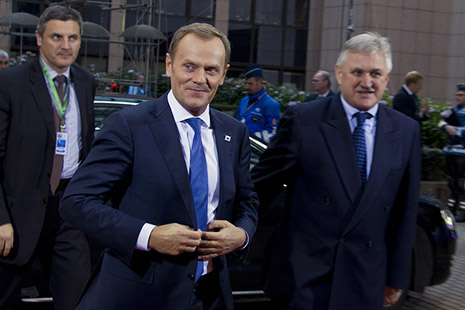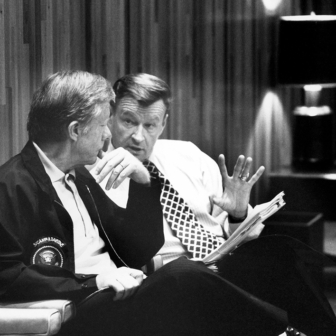IMAGINE you have been allocated a kind of Buggins’s turn at presiding for six months over the exclusive business association you’ve only fairly recently joined. Like the rest of the city, the Occidental has hit bad financial trouble, and the fear is spreading that some members, or even the club itself, hitherto a pillar of solvent respectability, might be facing bankruptcy. Other new members who joined at the same time as you did have already had their turn at the rotating presidency, but some senior members weren’t impressed by their performance and, indeed, had been sceptical about their joining the club in the first place. One had muttered audibly that the newcomers didn’t seem to know when to shut up. Another had reproached the new members collectively for their “bad manners.”
Once the colder financial winds started to blow, some establishment members were quick to point their fingers at the newcomers, suggesting that their shiny trousers and unsafe business practices would only bring discredit to themselves and financial damage to the club as a whole. But luckily the new members proved financially more resilient than some of the older ones. This was a relief in one way, but some establishment figures were now in such strife that it seemed the whole club might go down the gurgler, at which point degrees of culpability might seem less relevant. The president’s role had been downsized a bit after the new boys joined, but you still felt a heavy weight of responsibility when you assumed the mantle.
The two most senior members, who had traditionally run the club’s affairs de facto, had begun to feud publicly about what was to be done. Despite their disagreements, they organised crisis meetings, to which you and most new members were often not invited. You tried to speak up for the excluded members, but it was an invidious position from which to try to broker a solution.
On the other side of town, meanwhile, the rival Eurasian Club, of which you and other new boys had once been reluctant members, is staging something of a comeback after years of crisis and disintegration. You and some of the other new members feel that Eurasian’s resurgence is likely to take the form of hostile, legally dubious takeovers and even standover tactics, for which that club’s Mr Big has long been notorious. Two big neighbouring firms who had defected from Mr Big and have been showing interest in your association are under heavy and increasing pressure from Mr Big to go back to him.
You are very conscious that some of the influential older members of your own club feel Mr Big actually deserves more respect and attention from them than you think he does. You try very hard to establish polite and productive relations, but you are far from convinced that he is a reformed character. So to prevent his again becoming a dominant force in the city’s politics, and especially in your immediate neighbourhood, you are doing your best to persuade your midtown neighbours to come over to your side. Though schooled in the same tough neighbourhood as Mr Big, they seem wary of him, but unable to make up their minds.
Many senior club members are preoccupied with their own problems and have lost interest in attracting new members. One was even heard to snort from his deep chair in the members’ bar that riff-raff like would-be members B— and U— would be better off with Mr Big. “Let him sort them out.” Despite these discouraging signals you work on the seniors to keep the membership doors open. And you keep trying to persuade the wannabes to press their claims as persuasively as possible, almost in spite of themselves.
But suddenly one neighbour you were trying to sneak past the ethics committee gets involved in a dismaying spectacle of street violence, which convinces most of your club members that he is totally unworthy of a place in their midst. Even after that you don’t give up, but wipe the egg from your face and organise a very attractive rehabilitation package for him in exchange for a show of penitence. But he treats the offer you made on behalf of your club with public contempt and, to make matters worse, publicly abuses your club’s hard-working CEO in highly colourful language. You strongly suspect that Mr Big’s emissaries have nobbled him.
Then your other nearest neighbour also makes fresh trouble. Despite some increasingly visible peccadillos in his own life, he had been buttering up your senior members quite skilfully. You have done all you could to strengthen his commitment to your club’s values. But he seems to have a split personality. While one half of him seems genuinely to want to become a member, his behaviour at home suggests exactly the opposite and risks his being imminently blackballed. And you know that he is also talking with the Eurasian Club about joining them.
Suddenly he too becomes involved in nasty public violence against a business rival who evokes strong sympathy among your club members. You beg him to desist, fearing that your colleagues will recall reports of similar behaviour by him earlier in his career. Despite everything, you keep meeting with him, imploring him not to sink his chances of club membership and all the respectability and business advantages that could provide. You desperately want him to be given the nod by the club’s management committee before your term as president expires. And you still have the support of the club’s external liaison manager, despite her doubts about his suitability.
As that date approaches, you feel more and more desperate. You have nightmares he will suddenly appear on TV with Mr Big vowing his total commitment to the Eurasian Club. Or that one of your fellow club members will tell you in quite explicit terms that regardless of what your neighbour finally decides, they will veto him anyway.
But your biggest worry is the most senior and influential member of your association, by tradition the CEO of the most powerful company in the region, a position currently held for the first time by a woman – and from the other side of the tracks, which raised quite a few eyebrows at the time. She’s a brilliant negotiator and can work a committee room far better than any of her male detractors. You’ve cultivated close links with her and have a healthy respect for her company. But you feel very strongly that because of some unhappy episodes in the company’s history, on key issues affecting regional business confidence she’s got the wrong end of the stick. Finally you summon up your courage, and during a visit to her head office, launch a carefully calibrated but sharp critique of her whole approach. And now you’re anxiously awaiting the outcome of this risky manoeuvre.
SPARE a thought for Premier Donald Tusk, President Bronislaw Komorowski and Foreign Minister Radek Sikorski. They don’t have an easy life. And yet, despite all the troubles they are grappling with, reportedly not always in perfect unison, they are still getting a pretty good press abroad, as well as the usual bucketing at home from their domestic opponents. They must be doing something right. •




